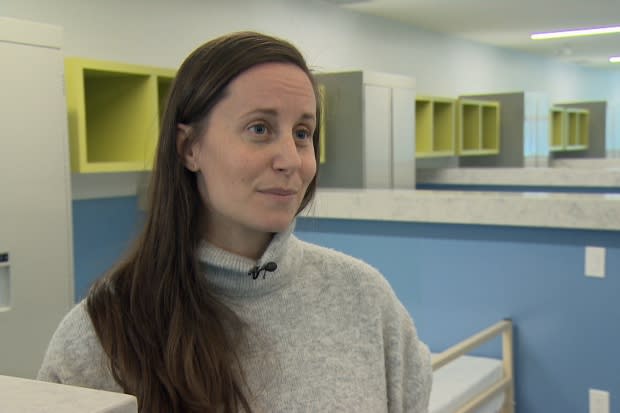'The hidden homeless': Downtown Toronto gets new women's shelter in wake of 2 deaths
A new women's shelter is offering a rare bright spot on this frigid weekend in Toronto, a city where many facilities are filled to capacity and where homeless people are building encampments in ravines, at busy intersections and under the Gardiner Expressway.
Neighbours in the area around Davenport Road and Dupont Street on Saturday were invited to attend an open house at the new four-storey, YWCA-run shelter that occupies a long, narrow lot at 348 Davenport Road.
Staff will begin registering the first residents on Monday, staggering the intake until the fifth week, when all 56 beds will be filled.
The new facility is part of the city's ongoing commitment to open 1,000 new shelter beds by the end of 2020.
Nina Gorka, the YWCA'S director of shelters, says the need is great. She calls women "the hidden homeless."
While men tend to be much more visible on the street — panhandling or living in makeshift structures and tents — Gorka says women are more likely to end up "couch-surfing" with friends or staying in respite centres.
This month, two horrific deaths highlighted the precarity of women's homelessness.
A need for holistic support
Hang Vo died last Tuesday, when she was crushed by a garbage truck backing down a dark alley in the early morning, just north of St. Andrew subway station. There were reports that Vo was asleep on a heating grate at the time of her death.
Crystal, identified only by her first name, died on January 8 after she became trapped in a clothing donations bin at Bloor and Dovercourt roads.
As the largest organization in Toronto serving women, Gorka says the YWCA is uniquely positioned to work with homeless women, especially those who are also dealing with addiction and sexual abuse.
"Lots of women who we see require supportive housing," says Gorka.
The YWCA already operates three shelters in the city — one for homeless women and two for women fleeing domestic violence, issues that are often intertwined.
"This is something the [YWCA] has done really well," says Gorka. "Not just offering a place to stay, but giving them holistic support."

The big prize, says Gorka, is helping women find permanent housing — something she says is embedded in the job descriptions of staff and in the policies of the new shelter on Davenport.
"How do we get creative about looking at housing?" says Gorka. "Instead of finding an apartment in which women live on their own, can women at the shelter get an apartment in which they are roommates?"
'They support each other'
She says the shelter will reserve the first 30 or so beds to deal with over-capacity issues at places like the Fred Victor Mission, as well as taking-in women from Sistering, a drop-in program for women.
Crystal, the woman who died in a clothing bin, cycled in and out of shelters and drop-in programs because of her disruptive behaviour. But some of the other women at the Sistering drop-in saw another side to Crystal.
Chantelle Mattix called her "a bubbly person" who struggled with addiction. "I loved her, I still love her," said Mattix, "even though she's not here anymore."
Marie Ventura, another regular at Sistering, echoed Mattix's feelings.
"For some reason, she took to me," said Ventura. "And I took to her, even though I don't do hardcore drugs. My poison's alcohol, but her and I had nice hugs."
Ventura added that Crystal "trusted too many people — she got burned a lot."
Gorka says those relationships highlight the community aspect of homelessness.
"These are people who take care of each other. They support each other. And the workers who support them are also impacted by these deaths, by these traumas," she explains.
Within that network, Gorka says many of them are doing the best they can. She points to two success stories of women who stayed at the YWCA'S original shelter, now both living in permanent housing.
One woman, who was applying for refugee status, spent two years at the shelter, even starting a business selling jewellery. She was eventually placed with a market-rent landlord, and contributes 30 per cent of her income towards rent, with ongoing support from a YWCA case manager.
Another was a teenager who had experienced family violence and struggled with substance use. Gorka says the young woman cycled in and out of the YWCA shelter over a period of about five years.
"We weren't always the best place for her, but there was no shame and judgement about coming back. She created strong relationships and she's learned a lot about moderating her substance use."
'Shelters can strengthen communities'
Meanwhile, the relationships with the shelter's immediate neighbours also require some tending.The YWCA has held two public meetings to introduce residents of the Davenport and Dupont neighbourhood to the new shelter.
"They're asking questions that are fair," says Gorka.
At a respite centre that occupied the site before the new shelter was constructed, much of the bedding consisted of mats on the floor. Some neighbours complained about transient people smoking outside the building, and garbage strewn around the site.
"This one will be slower and deliberate (about intake)," says Gorka. "There will be no mats on the floor. People will have beds and lockers."
Good relationships with neighbours are as important as the ones between shelter residents, says Gorka.
"Shelters can strengthen communities," she says. "Even people who weren't happy about the respite centre are more open to this."
One neighbour even showed up to a public meeting bearing caps and mittens for the future residents, she recalls.

